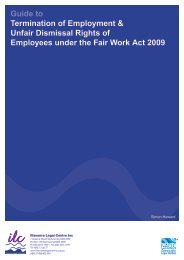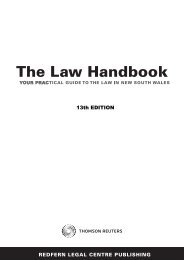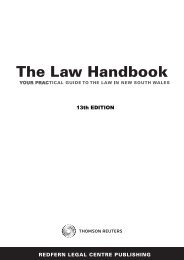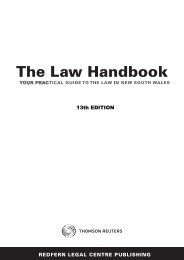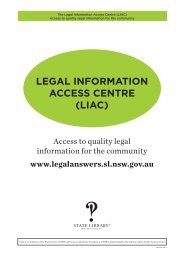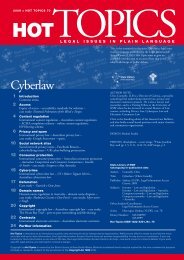Hot Topics - Issue 65: Human Rights - Legal Information Access ...
Hot Topics - Issue 65: Human Rights - Legal Information Access ...
Hot Topics - Issue 65: Human Rights - Legal Information Access ...
You also want an ePaper? Increase the reach of your titles
YUMPU automatically turns print PDFs into web optimized ePapers that Google loves.
ausTralia’s TreaTy<br />
TaBlinG arranGeMenTs<br />
treaty text<br />
<br />
cabinet or Ministerial agreement<br />
<br />
Federal executive council approval<br />
<br />
signature<br />
<br />
consultations continue on final treaty action,<br />
including any necessary legislation or changes to<br />
practice, with state and territory governments,<br />
peak industry bodies and ngos.<br />
<br />
cabinet or Ministerial agreement<br />
<br />
national interest analysis (nia) prepared.<br />
states and territories consulted in the<br />
development of nias in which they have a<br />
major interest and views reflected.<br />
<br />
Relevant number of copies of a treaty text and<br />
nia submitted to treaties secretariat for<br />
tabling in parliament.<br />
<br />
table treaty in parliament at least 15 sitting days prior<br />
to australia taking binding action.<br />
Joint parliamentary committee on treaties<br />
may consider treaty.<br />
<br />
Final treaty action through exchange of notes,<br />
ratification, accession etc. following Federal executive<br />
council approval where appropriate.<br />
HOT TiP<br />
‘exchange of notes’ is a form of agreement generally<br />
used for inter-governmental agreements of lesser<br />
importance. the exchange can also be used to modify,<br />
amend, terminate or extend an existing bilateral<br />
agreement. notes are usually approved in draft by<br />
both governments before exchange, which is usually<br />
conducted between a Minister and the ambassador, high<br />
commissioner or chargé d’affaires.<br />
remains the only democracy in the world not to have<br />
passed a law directly implementing the ICCPR.<br />
Australia has implemented some of its human rights<br />
treaty commitments, and international human rights<br />
law has a direct impact on our daily lives. For example,<br />
the Commonwealth Racial Discrimination Act 1975<br />
implements the Convention on the Elimination of All<br />
Forms of Racial Discrimination into Australian law,<br />
and the Commonwealth Sex Discrimination Act 1984<br />
implements some (but by no means all) of the rights for<br />
women contained in the Convention on the Elimination<br />
of All Forms of Discrimination Against Women.<br />
Australia has been much slower in implementing other<br />
international human rights obligations. For example,<br />
there is no national legislation that implements our<br />
obligations under the Convention on the <strong>Rights</strong> of the<br />
Child. Australia has announced that it considers the<br />
rights protected by the ICESCR to be adequately<br />
protected under existing Australian law, a claim disputed<br />
by some commentators.<br />
Australia has not effectively implemented the rights<br />
protected under the ICCPR. In 1986 the <strong>Human</strong> <strong>Rights</strong><br />
and Equal Opportunity Commission (HREOC) was<br />
established in response to Australia having ratified<br />
the ICCPR in 1980: see ‘Note’ on page 19. Although<br />
HREOC has powers to investigate alleged violations of<br />
the ICCPR, it has no powers of penalty or enforcement.<br />
This is insufficient to give effect to the requirement of<br />
the ICCPR that a ratifying state ensure that everyone<br />
has access to the rights set out in the treaty, together<br />
with effective remedies for breaches.<br />
federal GOvernMenT POsiTiOn On<br />
HuMan riGHTs<br />
In November 2007, a new Federal Government was<br />
elected under Prime Minister, the Honourable Kevin<br />
Rudd MP. The new Rudd Government announced that<br />
it would support a national community consultation<br />
on the most appropriate methods of protecting human<br />
rights. The issue of a Bill of <strong>Rights</strong> of some sort has,<br />
until recently, been avoided as a sensitive political issue<br />
in Australia. A direct response to any call for such a<br />
guarantee has been typically answered with a claim<br />
that the rights protected by the ICCPR and ICESCR<br />
are adequately protected by the common law, existing<br />
legislation, and the democratic nature of government.<br />
Many commentators disagree, and Australia is almost<br />
alone in the world in maintaining this view. In Australia,<br />
this view has become more keenly contested in recent<br />
years.<br />
Internationally, the Rudd Government has signalled a<br />
greater level of engagement in multilateral processes,<br />
including the UN. To understand why this is noteworthy,<br />
it is necessary to understand a little of the history<br />
preceding the election of the Rudd Government.<br />
During the time of the Howard Government (1996<br />
2007), the Australian Government expressed concern<br />
about the UN human rights system. For example,<br />
it characterised the CERD Committee’s approach to<br />
Australia’s periodic reports in 2000 as a ‘blatantly<br />
political and partisan approach’. The Howard<br />
Government also had concerns about what it called the<br />
‘burdensome reporting requirements imposed by these<br />
[human rights] committees’, and an ‘over-emphasis on<br />
non-governmental submissions (which) has led to a<br />
the operation of international human rights law in australia 21





